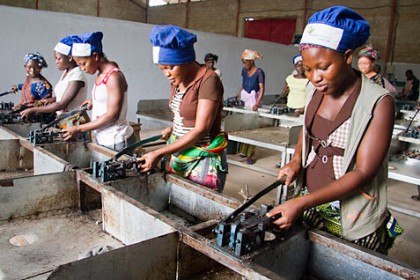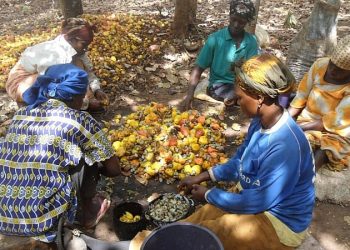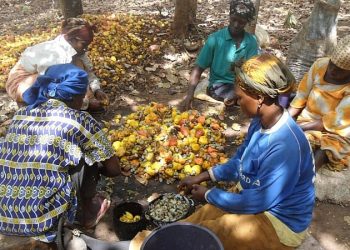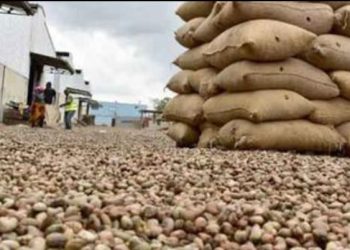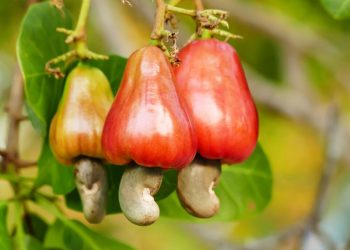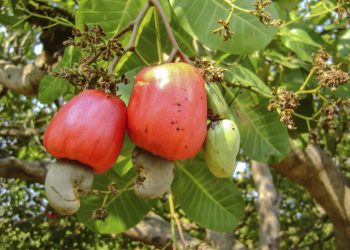The entire world is facing difficulties from COVID-19, but the impact so far on Africa has been mixed (opportunities and despair). Like every world crisis, this pandemic has exposed some sectorial weaknesses in our societies and Africa’s agricultural sector is no exception.
For many years, one of Africa’s major problems has been the exports of raw agricultural products to the rest of the world without value addition.
Despite being the highest producer of crops like cocoa, coffee, and cashew, processing in Africa remains low, resulting in low foreign exchange earnings and employment generation.
In the Cashew industry, according to the African Cashew Alliance (ACA), “over 2.5 million African farmers currently grow 57% of the world’s cashews” producing in excess of 2.1 million tons of Raw Cashew Nuts (RCNs). Unfortunately, RCN processing in Africa remains very low.
In 2015, only 6.6% (105,700 tons) of the 1.6 million tons of Africa’s RCNs were processed locally. It declined to 5% in 2018 but doubled to 10% (200,000 metric tons) in 2019, according to ACA’s 2018 and 2019 reports respectively.
The ACA estimates that a “25% increase in RCN processing within Africa would generate more than US$100 million in household income”.
So, why is Africa not processing much? Would COVID-19 make any difference?
Understanding the Impact of COVID-19 on the cashew industry
According to a Market Information Systems (MIS) expert, Jim Fitzpatrick, whereas the pandemic has a quite negative impact on the supply and production aspect of the cashew value chain, its impact on demand and consumption has so far been positive.
Global production reduced from about 3.5 million tons in 2019 to about 3 million tons in 2020. Africa’s production declined from an estimated 2.1 million tons to about 1.7 million tons, with production in West Africa dropping from 1.6 million to 1.3 million tons.
The fall in production can largely be attributed to the pandemic. As explained in my previous article on the role of government in strengthening the cashew industry (read on ACA website), the closed borders due to the pandemic meant exporters could not come down to buy raw nuts and were unwilling to release funds for their agents to buy.
The risk of getting infected by COVID-19 did not allow local buyers to purchase from farm gates and the absence of proper storage facilities meant farmers could not store their nuts. This caused prices of RCN to fall, discouraging some farmers who were yet to harvest.
This had huge financial implications on farmers, RCN buyers, and exporters. As a result, producers and exporters could not meet the demand for RCN by both local and foreign processors.
Contrary to the negative impact of COVID-19 on producers and suppliers, consumption of cashew increased significantly in the United States and Europe and as a result, according to Jim Fitzpatrick, demand for cashew kernel increased by 18.58% and 5.48% respectively in these areas.
This implies that the pandemic created an opportunity for processors to increase processing to meet the increasing demand and consumption of cashew kernel. RCN prices fell and demand for kernel increased, which means processors, subject to other factors, could have increased their profit margins.
In Vietnam, processing and export of cashew kernel increased by 78%,38%, and 18% in February, March, and April respectively compared to the same periods in 2019.
Did local processors in Africa take advantage of this opportunity? Were local processors in the best conditions to take advantage of this opportunity?
A closer look at Africa’s cashew processing sector (Ghana as a case study)
While access to appropriate and reliable financing is a general challenge for cashew processors across Africa, there are peculiar challenges processors face in the various cashew processing countries.
In Ghana, local cashew processors have been through periods of difficulties. Before 2015, cashew processing factories depended largely on raw nuts from Cote d’ Ivoire and other neighbouring cashew producing countries.
In 2015, the Ivorian government banned cross-border transport of cashew. This affected most cashew factories in Ghana, who struggled to penetrate their local RCN market, causing some to shut down. It took the support of the African Cashew Alliance, and GIZ/ComCashew to revive some of these factories.
Managing Director at the ACA, Ernest Mintah, explains that COVID-19 came at a time when most of these factories were beginning to gain roots.
According to him, the pandemic further compounded the financial challenges of local processors as those who had earlier arranged for financing could not access the funds because financiers were uncertain of the impact the pandemic would have on the industry.
As a result, at a point during the pandemic, only two of 14 local processing factories in Ghana were operational.
In Cote d’ Ivoire, about 70% of local factories shut down. It took, once again, ACA, GIZ/ComCashew, and other partners, to provide personal protective equipment and get consultants to provide technical assistance to some of these factories, to get back into processing.
So yes, COVID-19 created an opportunity for local processors, RCN prices fell and were abundant in Africa, but unfortunately, most local processors were not in good financial standings to take advantage of the situation.
President of the Association of Cashew Processors Ghana (ACPG), Malvin Nii Smith, explains that the unexpected nature of the pandemic, and the fact that local processors always plan ahead of the cashew season, made it difficult for them to readjust to take advantage of the situation, considering the additional cost the pandemic had on them.
That aside, though RCNs were available at low prices in Africa, in some countries like Ghana, they were not accessible to local processors due to poor storage mechanisms.
Mr. Mintah explains that a significant portion of the about 100, 000 to 200,000 metric tons of RCN estimated to remain in Africa are likely to go bad in farmers’ fields, homes, and in some poor storage facilities.
Way forward
Not to underestimate the impact of COVID-19, It is clear that the issue of low local cashew processing in Africa is not a COVID-19 problem.
It is one that existed long before the pandemic. It is, therefore, necessary that a more holistic approach is adopted in dealing with both the challenges processors are facing in these times to keep them operational and most importantly in dealing with those challenges they had faced all these years.
To reiterate my call in the previous article, in the short term, governments need to empower local processors to maximize processing to at least absorb the over 100,000 to 200,000 tons of RCNs estimated to remain in Africa.
Governments also have to consider waiving some taxes off local processors, support the ACA and GIZ/Comcashew’s efforts to provide personal protective equipment, and also provide stimulus packages for some of these factories.
In the long term, however, I agree with both the ACPG president, Mr. Smith, and the MD of ACA, Mr. Mintah, that there is the need for a policy shift towards empowering local processors in Africa to grow. Governments would have to enact and implement policies that create favourable conditions for local processors to thrive.
The policy supports that allow local processors to have access to appropriate, less expensive and reliable financing; policy supports that will make it possible for local processors to buy and stock enough RCN in certain periods before allowing licenced foreign buyers to buy under strict regulations like it is done in Mozambique, and policies that will motivate local processors and make the industry attractive to investors are very necessary.
For all these to be possible, there is the need for the right regulatory structures to be set up in the various cashew processing countries. In Ghana, expedited measures should be taken in implementing the Ghana Tree Crop Development law enacted by parliament in 2019.
It is fulfilling to know that the board will be inaugurated in the coming days. But beyond the inauguration, the board should be given the necessary financial and technical support to function. Just like Ernest and Malvin, I am confident that the Tree Crop Development Authority will be in the best legal and financial position to properly regulate and develop local cashew processing and the industry at large.
Ghana, and Africa at large, has a very promising cashew industry and with the right policies and commitment from various stakeholders, it can contribute significantly to the socio-economic development of the region.






